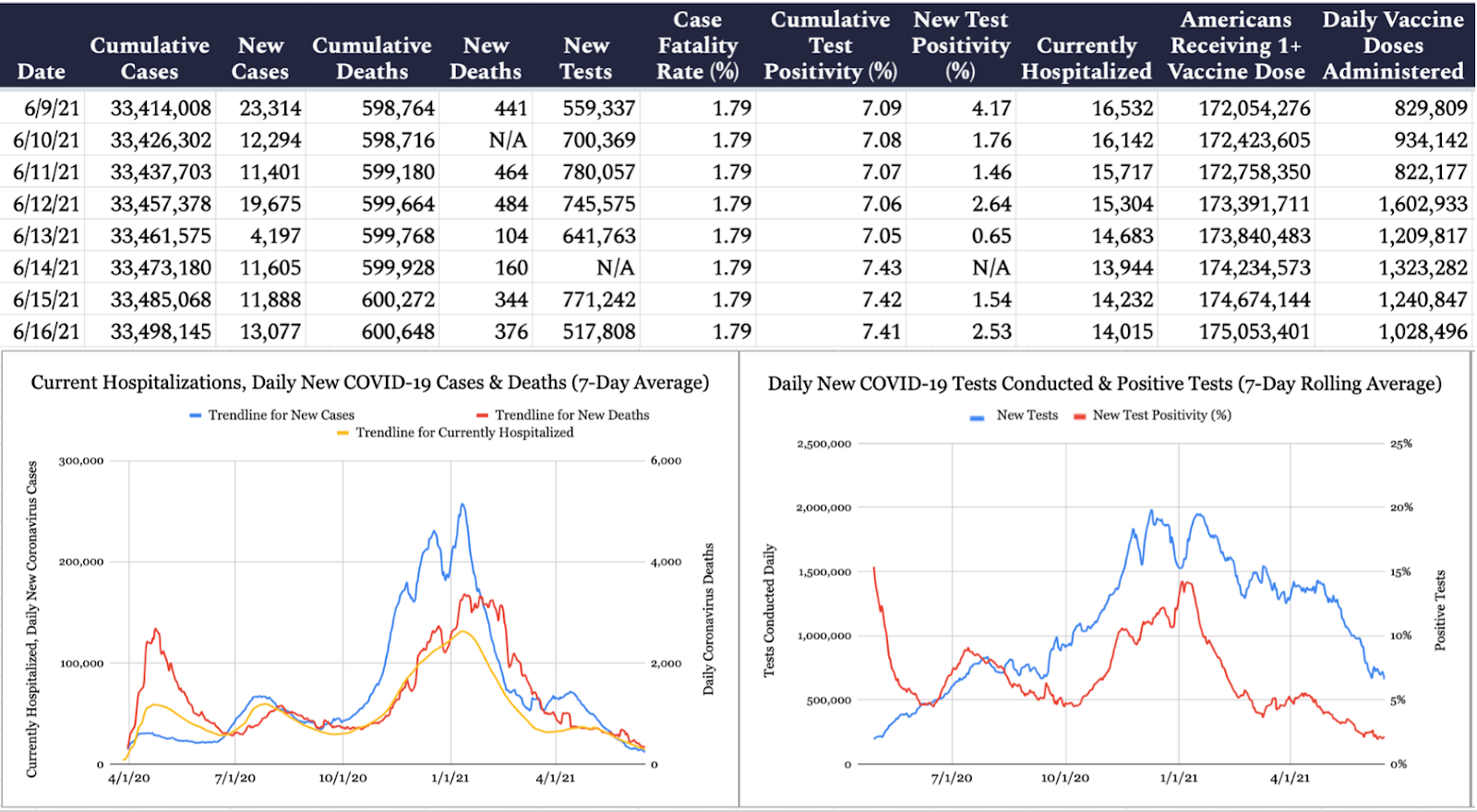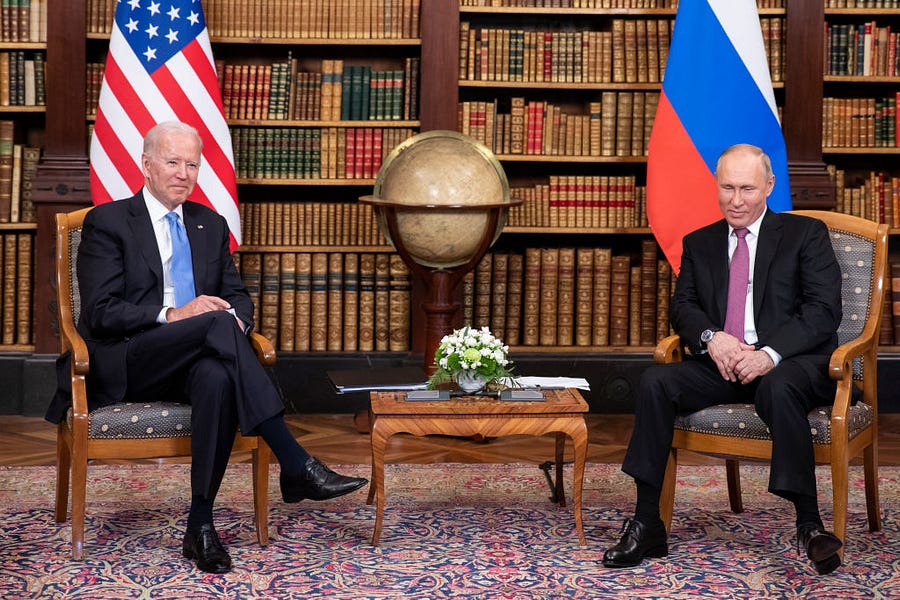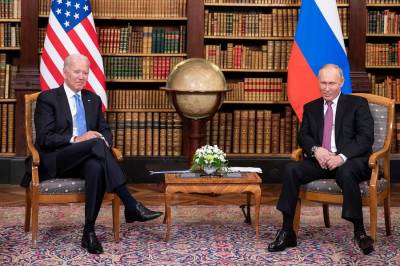Happy Thursday! It’s national Eat Your Vegetables Day, and we’re celebrating by dishing up items on bilateral diplomacy and monetary policy. But don’t worry, there’s dessert (Presented Without Comments) on the other end.
Quick Hits: Today’s Top Stories
President Joe Biden and Russian President Vladimir Putin met for their first bilateral summit of Biden’s term Wednesday. Both leaders said the talks were not hostile, but no breakthroughs emerged on any areas of national contention, including Russian cyberattacks against the United States.
The U.S. government has purchased an additional 200 million doses of Moderna’s COVID-19 vaccine, the biotech company announced Wednesday. According to the White House, the agreement applies to current as well as possible future iterations of the drug, such as pediatric doses or shots designed to combat new COVID variants.
The House of Representatives voted overwhelmingly on Wednesday to make Juneteenth, which commemorates the day the last enslaved Americans learned they had been emancipated, a federal holiday. The bill passed unanimously in the Senate earlier this week, and President Biden is scheduled to sign the legislation into law later today.
The Federal Reserve on Wednesday held interest rates steady near 0 percent, but signaled that two rate hikes could come before the end of 2023, sooner than previously expected. It also upped its inflation expectation for this year from 2.4 percent to 3.4 percent.
The Justice Department on Wednesday dropped its case against former national security adviser John Bolton regarding whether his memoir, published last year, contained classified information.
The Department of Education announced Wednesday that it will interpret Title IX, which prohibits sex discrimination in schools that receive federal funds, to include protections for gay and transgender students. The new guidance—a reversal of the Department’s previous position under Trump—relies on Bostock v. Clayton County, a 2020 Supreme Court decision in which Justice Neil Gorsuch wrote that “it is impossible to discriminate against a person for being homosexual or transgender without discriminating against that individual based on sex.”
An extreme heat wave has broken high-temperature records across the Southwest. Much of the region was already suffering from drought conditions, leading to increased wildfire risks.
The United States confirmed 13,077 new cases of COVID-19 yesterday per the Johns Hopkins University COVID-19 Dashboard, with 2.5 percent of the 517,808 tests reported coming back positive. An additional 376 deaths were attributed to the virus on Wednesday, bringing the pandemic’s American death toll to 600,648. According to the Centers for Disease Control, 14,015 Americans are currently hospitalized with COVID-19. Meanwhile, 1,028,496 COVID-19 vaccine doses were administered yesterday, with 175,053,401 Americans having now received at least one dose.

Biden Meets With Putin
From the annual G7 summit in Cornwall, England to a conference of NATO leaders in Brussels, the early legs of President Biden’s first trip abroad allowed him to prioritize his stated foreign policy goals of multilateralism, institutionalism, and leading with diplomacy. Part of this effort involved rallying the longtime American allies against common adversaries in China and Russia.
Unsurprisingly, tensions ran high heading into the president’s long-awaited face-to-face meeting with Russian President Vladimir Putin Wednesday. Against the scenic backdrop of the 18th-century Villa La Grange in Geneva, Switzerland, the two heads of state convened to make “practical, straightforward, no-nonsense decisions,” in the words of Biden, who shifted away from the past week’s language of friendship in favor of a realpolitik approach.
“This is not a ‘kumbaya’ moment, as you used to say back in the ’60s in the United States, like, ‘Let’s hug and love each other,’” Biden recounted telling Putin in a press conference after their conversation. “But it’s clearly not in anybody’s interest—your country’s or mine—for us to be in a situation where we’re in a new Cold War.”
Given the tense lead-up to the meeting, some observers argued it was unnecessary and fraught with peril. Others worried that an in-person rendezvous signaled a policy of appeasement to bad actors worldwide by legitimizing an autocratic ruler. The latter concern seemingly came to pass as the talks opened when Biden referred to Russia as a “great power” and, by some journalists’ assessments, indicated that he trusted Putin when he responded to a question with an affirmative nod—something both he and White House communications director Kate Bedingfield walked back in subsequent remarks.
But both presidents seemed to walk away from the sessions satisfied by their respective outcomes. Biden said that the meeting was “positive,” while Putin added that it turned out to be “quite constructive.”
According to Matthew Rojansky, director of the Wilson Center’s Kennan Institute, the Biden team “intentionally set low expectations” ahead of talks with Moscow. “In that sense, the low expectations were fulfilled. Maybe they were even exceeded, to be quite honest with you,” Rojansky told The Dispatch. “I did not expect there to be a joint statement, but there was a joint statement and it was a good statement. It focused on the one issue where there is clearly common ground, which is strategic stability.”
The presidential statement borrowed directly from that of former President Ronald Reagan and Soviet President Mikhail Gorbachev in 1985, also crafted on the banks of Lake Geneva. “Today, we reaffirm the principle that a nuclear war cannot be won and must never be fought,” the Biden-Putin statement recited nearly word-for-word. This common commitment to preventing nuclear escalation, Rojansky explained, is a “gateway issue” that has long allowed Washington and Moscow to breach other, more fraught topics.
Among the topics of discussion this time around were Russian election interference and cyber aggression. On the heels of the SolarWinds hack, attributed to Russian intelligence service, and a series of ransomware attacks on a U.S. oil pipeline and meat plants, conducted by cybercriminals based in Russia, Biden sought to articulate new redlines in cyberspace. Critical infrastructure, Biden reportedly told Putin, must be “off limits” to intrusions. The Russian president largely dodged the issue, denying responsibility for the attacks and accusing the U.S. of engaging in cyberwarfare of its own against Moscow.
Biden addressed another tricky subject head-on: Human rights abuses within Russia, with particular attention to the imprisoned opposition leader Alexei Navalny, whom Putin refused to mention by name. “This person knew that he was breaching the laws effective in Russia,” Putin said.
Biden clearly wasn’t satisfied by that answer. “I also told him that no President of the United States could keep faith with the American people if they did not speak out to defend our democratic values, to stand up for the universal rights and fundamental freedoms that all men and women have, in our view. That’s just part of the DNA of our country,” Biden said afterward. “It’s not about just going after Russia when they violate human rights; it’s about who we are.”
The two leaders reportedly touched on future cooperation in areas of mutual interest, including humanitarian aid to Syria, economic cooperation in the Arctic, and counter-terrorism efforts in Afghanistan post-U.S. withdrawal. Ukraine and Belarus—both of which the Kremlin considers outside of Washington’s reach—were also discussed.
While Biden appears to have scraped through the summit with minimal confrontation or bluster, its fruits remain to be seen. When Biden was asked by CNN’s Kaitlan Collins why he was confident he could alter Putin’s behavior, the president grew visibly frustrated. “I’m not confident,” Biden responded. “I said what will change their behavior is if the rest of the world reacts to them and it diminishes their standing in the world. I’m not confident of anything. I’m just stating the facts.”
When Collins pushed back, citing Putin’s reluctance to take accountability for various transgressions addressed in the summit, Biden hit back: “If you don’t understand that, you’re in the wrong business.” (He later apologized for being “such a wise guy.”)
But some American lawmakers agree with the line of questioning, casting doubt on the president’s insistence that Russia will improve its conduct to avoid the classification of a pariah state.
“It is very disturbing to hear President Biden suggest that it would hurt Putin’s standing if people throughout the world believed he interfered in our election or the elections of other nations,” Sen. Lindsey Graham said following the summit. “It is clear to me that Putin could care less about how he’s viewed by others and, quite frankly, would enjoy the reputation of being able to successfully interfere in the internal matters of other countries.”
“Equally disturbing was the statement by President Biden telling Putin that if harm came to dissident Alexei Navalny that it would hurt Putin’s standing with the rest of the world. Again – I believe President Biden has miscalculated who he is dealing with,” Graham added. “Putin could care less about how the world views his efforts to silence dissidents at home and abroad.”
Federal Reserve Moves up Rate Hikes
As far as Federal Open Market Committee (FOMC) meetings go, yesterday’s was highly anticipated.
“I hope that they will send a signal that they’re afraid of inflation,” GOP Sen. Chuck Grassley told The Dispatch Wednesday morning when asked about the Federal Reserve committee that oversees the United States’ monetary policy. “They haven’t been very open about that, but they’ve got to learn the lesson from the 1970s.”
With total employment still approximately 7.6 million jobs below pre-pandemic levels and inflation running hotter than expected over the past two months, all eyes were on Fed Chairman Jerome Powell yesterday afternoon, with onlookers eagerly awaiting information on whether the central bank would adjust its previously charted course.
The answer was yes—kind of. Citing its “maximum employment and price stability goals,” the FOMC unsurprisingly opted to hold the target federal funds rate steady at 0 to 0.25 percent and continue purchasing $120 billion worth of Treasury securities and mortgage bonds every month. But the committee also revised its expected 2021 GDP growth to 7 percent—up from 6.5 percent in March—and raised its inflation projection for this year (using the personal-consumption expenditures price index) from 2.4 percent to 3.4 percent.
The biggest news of the day was the FOMC’s reaction to these adjusted projections. In March, the median FOMC forecast expected today’s near-zero interest rates to hold steady through at least 2023. Now, two rate hikes—to 0.6 percent—are expected by the end of that year.
Stocks slid in response to the news—the Dow Jones Industrial Average ended Wednesday down 0.8 percent, and the S&P 500 down 0.5 percent—but John Fagan, co-founder of Markets Policy Partners and former director of the Treasury Department’s Markets Room, believes the “hawkish surprise” narrative is a bit overblown.
“What [the Fed] did was ... almost like costlessly tightening,” Fagan told The Dispatch. “Pulling forward rate hikes from 2024 into 2023 is like us betting on a Red Sox v. Braves game in 2024.”
Powell, who was appointed to his position by former President Donald Trump in late 2017, said as much in an hour-long press conference following the meeting. “Of course, these projections do not represent a committee decision or plan, and no one knows with any certainty where the economy will be a couple of years from now,” he told reporters, reversing some of the stock sell-off that had begun as soon as the initial news broke.
“The dots are not a great forecaster of future rate moves,” Powell added, arguing that FOMC interest rate projections “should be taken with a big, big grain of salt.”
An overarching goal of yesterday’s moves seemed to be to shift the conversation toward what a post-pandemic monetary policy will look like—even if the FOMC doesn’t believe we are fully there yet.
Asked about the Federal Reserve’s timeline for tapering its monthly asset purchases, Powell said the committee had some conversations about it but needs more data before making any concrete decisions. “You can think of this meeting that we had as the ‘talking about talking about’ meeting, if you like,” he replied.
Although the Fed upped its inflation expectations for the year, Powell sounded far less anxious about the phenomenon than Grassley had hoped. “So inflation has come in above expectations over the last few months,” he said. “But if you look behind the headline numbers, you’ll see that the incoming data are consistent with the view that the prices that are driving that higher inflation are from categories that are being directly affected by the recovery from the pandemic and the reopening of the economy.”
“It seems likely that these very specific things that are driving up inflation will be temporary,” Powell added, citing the supply chain bottlenecks and sourcing shortages that have led to increased prices for products like lumber and used cars.
GOP Sen. Pat Toomey, ranking member on the Senate Banking Committee, said he thinks Powell isn’t taking the threat of inflation seriously enough.
“Today’s announcement shows the Fed is continuing to prioritize maximum employment over controlling inflation,” Toomey told The Dispatch. “When you subordinate the price stability mandate to try and maximize employment, you run the risk of failing on both fronts because you need stable prices to achieve a strong economy. I am concerned that if inflation is not transitory, the Fed will be behind the curve and likely unable to respond in time to head off an even bigger problem down the road.”
Worth Your Time
Writing for FiveThirtyEight, Lee Drutman makes the case that political polarization in America is uniquely bad when compared with other developed democracies—and that changing our voting system to allow for multiple parties might be the way out. “There’s no shortage of plausible explanations for why U.S. politics has become so polarized, but many of these theories describe impossible-to-reverse trends that have played out across developed democracies, like the rise of social media and the increased political salience of globalization, immigration and urban-rural cultural divides,” he writes. “All of these trends are important contributors, for sure. But if they alone are driving illiberalism and hyper-partisanship in the U.S., then the problem should be consistent across all western democracies. But it isn’t.”
Nigerian writer Chimamanda Ngozi Adichie, known for novels like Americanah and for her mentorship of young African writers, set the literary internet on fire Tuesday when she published an essay in which she described watching a former student spend months slandering her online. That might seem like a simple gossip story, but the novelist spins it into a treatise on the evils of an internet culture that encourages the performance of virtue above virtue itself, rewards notoriety at any cost, and allows some to believe that there is no vice in service of the right ideology. “In a deluded way, you will convince yourself that your hypocritical, self-regarding, compassion-free behavior is in fact principled feminism. It isn’t. You will wrap your mediocre malice in the false gauziness of ideological purity. But it’s still malice.”
Presented Without Comment
Also Presented Without Comment
Toeing the Company Line
The critical race theory (CRT) battle has quickly invaded school boards—and cable news studios—across the country, but is everyone arguing in bad faith? The gang considers the politics of CRT and the role of legislators in regulating public school curriculum on this week’s Dispatch Podcast. Plus, Sarah points out the flaws in issue polling and why we should be skeptical of the results, and a discussion of President Biden’s first foreign trip since assuming the Oval Office.
In his latest French Press (🔒), David takes a deep dive into a discrimination complaint against Stanford University’s Counseling and Psychology Services division (CAPS) and explains how existing law is already well-equipped to deal with instances of “woke” overreach. “Time and again I read ridiculous complaints that I advocate ‘surrender’ in the face of ‘wokeness,’” he writes. “Nope, I advocate the rule of law in the face of discrimination and liberty in support of free speech. Those concepts are defined in the law, and they work together to guard both American liberty and American diversity. They stand as a bulwark against the re-emergence of any dominant ideology that would seek to subordinate any American citizen merely because of their racial heritage or the color of their skin.”
Know Nothings, morons, and idiots are the subject of Jonah’s latest G-File (🔒). “There’s something grotesque and disordered about a society that thinks passion—particularly baser passion—is something to celebrate,” he writes. “If you don’t know what you’re talking about and you want to run for office, you have a moral and patriotic obligation not to be an idiot.”
In this week’s Capitolism (🔒), Scott Lincicome details how old bad policy generates new bad policy. “U.S. law and regulation are littered with attempts to ‘fix’ problems caused by other government policies,” he writes. “Not by reforming or eliminating those policies but through even more subsidies, tariffs, regulations, or waivers.”
Let Us Know
Speaking of “eating your vegetables,” what are some of the factors that contribute to whether or not you read the entire TMD on a given day?
Reporting by Declan Garvey (@declanpgarvey), Andrew Egger (@EggerDC), Charlotte Lawson (@charlotteUVA), Tripp Grebe (@tripper_grebe), and Price St. Clair (@PriceStClair1).







Please note that we at The Dispatch hold ourselves, our work, and our commenters to a higher standard than other places on the internet. We welcome comments that foster genuine debate or discussion—including comments critical of us or our work—but responses that include ad hominem attacks on fellow Dispatch members or are intended to stoke fear and anger may be moderated.
With your membership, you only have the ability to comment on The Morning Dispatch articles. Consider upgrading to join the conversation everywhere.